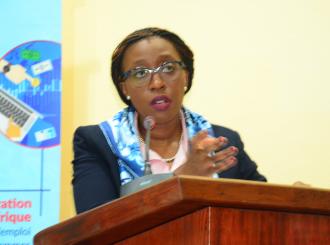
Yaounde, 22 April 2019 (ECA) – Much to an ecstatic applause from the academic community and members of the Government of Cameroon, the Execrative Secretary of the UN Economic Commission for Africa (ECA) – Ms. Vera Songwe, made a strong case for the country to ratify and take leadership in the African Continental Free Trade Area (AfCFTA) agreement while toning up its digital economy, as she ended her first official visit there recently.
“With the AfCFTA, markets open up, demand for goods and services from other parts of the continent increase, and you have an opportunity to improve on supply” to get income that would help power the double-digit growth crucial for Cameroon to attain emergence, she argued in a high-level exchange at the International Relations Institute of Cameroon (IRIC).
The free market agreement, to soon go operational on the continent, opening up a vista to 1.2 billion consumers and more than 2.5 trillion dollars collective GDP, is an avenue of economic interdependence, she maintained.
The beauty of the African Continental Free Trade Area agreement is that it allows countries to specialize in their areas of competitiveness and export profitably to their immediate neighboring as well as those further afield, she said.
“Half of the chicken that is eaten in Africa comes from Brazil because we do not have the corn they need for their feeds all year round,” she explicated.
But with the AfCFTA, Cameroon could easily import corn from Botswana when the feed is not in season, and vice versa, she mooted.
She argued that economic integration and economic interdependence was very important even for a country such as Cameroon, which has the most diversified economy in Central Africa.
To elucidate this, she drew the example of the recent oil glut, which must have affected Cameroon’s exports to Angola because the latter country, highly dependent on oil for foreign income, would not be in a position to import as much as it normally did from Cameroon given its own falling oil revenue.
“The beauty of the AfCFTA is that it looks at the collective,” and not countries operating unilaterally, she added.
Ms. Songwe said the AfCFTA was not just a trade agreement but an investment agreement which would stimulate new businesses in the manufacturing and services sector, leading to jobs and economic growth.
With the assurances she had already received from Cameroon’s government officials, ECA’s Executive Secretary was forward looking but cautioned that “the free trade area agreement will not become reality if we do not take away the non- tariff barriers to trade.”
She spelt out the nexus between implementing the free trade area agreement and boosting the digital economy.
“When you put together the digital economy, the African Continental Free Trade begin to get an Africa where poverty will be a thing of the long time past,” Ms. Songwe declared.
ECA’s Executive Secretary implored Government policy makers in Cameroon to increase access to, reduce the cost of and improve the quality of broadband in other to give its digital economy full leverage.
In her view, it was all about a digital economy where Africans themselves create software and digital enterprises and have easy access to intellectual property rights registration and certification.
African countries therefore needed to urgently bring down the prohibitive costs of intellectual property certification, to let digital initiatives like those shoring up in Cameroon’s Silicon Mountain (name of the community of tech startups in the county’s Southwestern town of Buea) to blossom, she went on.
She encouraged Cameroon to develop a digital Identification (Digital ID) system for its citizens. This would enable them have increase access to education and e-government services, while improving on social inclusion, Fintech, security and governance itself.
Noting that this was a matter of government policy, Ms. Songwe recalled that “through a digital ID program, India was able to register 1 billion people in 4 years. This means we can do it in Cameroon.”
In concordance, Cameroon’s Minister of Economy, Planning and Regional Development, Alamine Ousmane Mey, said the AfCFTA and the digital economy equation were of prime importance to Cameroon which, he said, had understood the need to hinge progress on a three-fold connectivity approach: improving on road infrastructure, boosting energy supply and overhauling its telecommunications.
This approach, he said, were relevant across Africa which must leverage these sectors to prevent a scenario of 400 million people on the continent living in poverty by 2050.
In concluding about Africa’s feat in successfully creating a single market, Ms. Vera Songwe said “It’s impossible until it’s done. We have now done it. We just need to sit down and reap the benefits of it.”
An elated Director of the prestigious International Relations Institute of Cameroon – H.E. Mr. Salomon Eheth, described ECA’s Executive Secretary as: “a great woman with a brilliant curriculum and a model to Cameroon’s youths.”
-ENDS-
Media Contact
Abel Akara Ticha – Communication Officer
UN Economic Commission for Africa
No 637 Rue 3.069, Quartier du Lac, Yaounde
Tel: 237 222504348
Email: akara@un.org